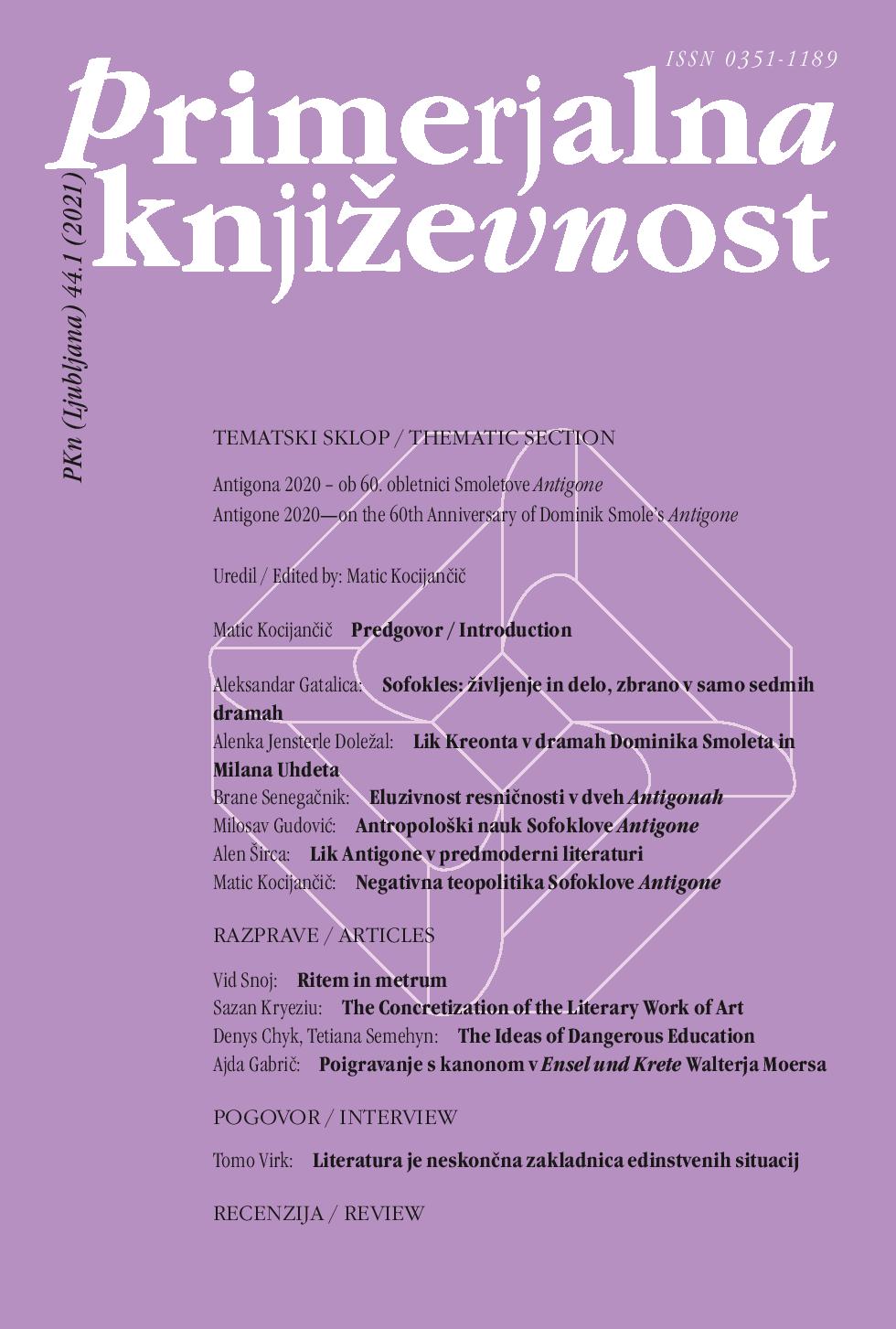Power of the Absent: Elusiveness of the Real in the Two Antigones
DOI:
https://doi.org/10.3986/pkn.v44.i1.03Keywords:
Slovenian drama, Greek tragedy, Sophocles, Smole, Dominik, Antigone, literary influences, intertextuality, ethics, ultimative realityAbstract
Sophocles’s Antigone famously never introduces gods on stage (even in the form of prophecy), and yet everything happens through their agency. The authority of the gods is never called into question; their absence, however, makes their will elusive and unclear, which enables Antigone and Creon to interpret it in completely different ways and causes their fatal conflict. When Teiresias reveals that Creon is wrong, it is too late for Antigone, who dies because she remains true to her (correct) understanding of the divine will (law), although unsupported by any, either divine or human, external authority. In Dominik Smole’s Antigone, by contrast, it is the heroine herself who is absent until the very end of the play, when, after her death, the Pageboy takes over her role. Smole’s radical innovation persistently draws the reader’s (audience’s) attention to the background of the dramatic action, to the invisible reality beyond the stage: to the forbidden region outside society where the key questions of historical truth and of the quintessence of human existence arise. There is a striking analogy between the two Antigones, both in terms of dramaturgy and representation of reality: both plays present the ultimate reality (gods in Sophocles, true human identity in Smole) as hidden yet effective. This ultimate reality reveals itself as a dark horizon and keeps the reality of human existence open. In addition to the central theme, the paper discusses a number of questions about the motivation for reinterpreting canonical texts.
References
Critchley, Simon. <em>Tragedy, the Greeks, and Us</em>. New York, NY: Pantheon Books, 2019.
Croally, Neil. »Tragedy’s Teaching«. <em>A Companion to Greek Tragedy</em>. Ur. Justina Gregory. Malden, MA, Oxford, Victoria: Balckwell Publishing, 2005. 55‒70.
Csapo, Eric, in William J. Slater. <em>The Context of Ancient Drama</em>. Ann Arbor, MI: The University of Michigan Press, 1994.
De Kesel, Marc. <em>Eros and Ethics. Reading Jacques Lacan’s Seminar VII</em>. Albany, NY: State University of New York Press, 2009.
Diller, Jeanine, in Asa Kasher, ur. <em>Models of God and Alternative Ultimate Realities</em>. Dordrecht, Heidelberg, New York, NY, London: Springer, 2013.
Griffith, Mark, izd. <em>Sophocles. Antigone</em>. Cambridge: Cambridge University Press, 1999.
Grün, Herbert. »Mariborska Drama. Prerojenje zavoda?«. <em>Nova obzorja</em> 5‒6 (1961): 250‒255 (=Schmidt, <em>Dominik Smole. Zbrano delo. Druga knjiga</em> 244‒254).
Halliwell, Stephen. »Learning from Suffering«. <em>A Companion to Greek Tragedy</em>. Ur. Justina Gregory. Malden, MA, Oxford, Victoria: Balckwell Publishing, 2005. 392‒412.
Heidegger, Martin. <em>Gesamtausgabe 53: Hölderlins Hymne »Der Ister«</em>. Frankfurt ob Majni: Vittorio Klostermann, 1993.
Heidegger, Martin. <em>Uvod v metafiziko</em>. Prev. Aleš Košar. Ljubljana: Slovenska matica, 1995.
Inkret, Andrej. <em>Esej o dramah Dominika Smoleta</em>. Maribor: Založba obzorja, 1968. (=Schmidt, <em>Dominik Smole. Zbrano delo. Druga knjiga</em> 549‒551).
Inkret, Andrej. »Vprašanje o odsotni Antigoni«. <em>Primerjalna književnost</em> 1 (1981): 12‒15 (=Schmidt, <em>Dominik Smole. Zbrano delo. Druga knjiga</em> 600‒602).
Kavčič, Vladimir. »Abstraktnost 1960«. <em>Naši razgledi</em> 25. 2. 1961: 4 (=Schmidt, <em>Dominik Smole. Zbrano delo. Druga knjiga</em> 498‒502).
Kermauner, Taras. <em>Perspektivovci</em>. Ljubljana: Znanstveno in publicistično središče, 1995. (=Schmidt, <em>Dominik Smole. Zbrano delo. Druga knjiga</em> 175‒176).
Kos, Janko. »Resnica današnje drame, III«. <em>Perspektive</em> 8 (1961): 1042‒1052 (=Schmidt, <em>Dominik Smole. Zbrano delo. Druga knjiga</em> 462‒477).
Kraigher, Dragana. »Končna postaja ‒ osveščenost!«. <em>Tribuna</em> 11. 5. 1960: 5 (=Schmidt, <em>Dominik Smole. Zbrano delo. Druga knjiga</em> 222‒225).
Lacan, Jacques. <em>Etika psihoanalize</em>. Ljubljana: Delavska enotnost, 1988.
Miller, Paul A. »Lacan’s Antigone: the Sublime Object and the Ethics of Interpretation«. <em>Phoenix</em> 61.1/2 (2007): 1‒14.
Müller, Gerhard. »Chor und Handlung bei den griechischen Tragikern«. <em>Sophokles</em>. Ur. Hans Diller. Darmstadt: Wissenschaftliche Buchgesellschaft, 1967. 212‒238.
Nagy, Gregory. »The Earliest Phases in the Reception of the Homeric Hymns«. <em>The Homeric Hymns. Interpretative Essays</em>. Ur. Andrew Faulkner. Oxford: Oxford University Press, 2011. 280–333.
Popovič, Anton. »Aspects of Metatext«. <em>Canadian Review of Comparative Literature</em> 3 (1976): 225–235.
Predan,Vasja. »Smoletova Antigona«. <em>Ljubljanski dnevnik</em> 12. 4. 1960: 3 (=Schmidt, <em>Dominik Smole. Zbrano delo. Druga knjiga</em> 214‒217).
Rudolf, Branko. »Smoletova Antigona«. <em>Delo</em> 9. 11. 1960: 6 (=Schmidt, <em>Dominik Smole. Zbrano delo. Druga knjiga</em> 238‒240).
Schmidt, Goran, ur. <em>Dominik Smole. Zbrano delo. Druga knjiga</em>. Ljubljana: Založba ZRC, 2009.
Schmidt, Goran, ur. <em>Dominik Smole. Zbrano delo. Peta knjiga</em>. Ljubljana: Založba ZRC, 2010.
Smole, Dominik. »Nevezan pogovor z avtorjem <em>Antigone</em>«. Nepodpisano; najverjetneje je spraševal Lojze Filipič. <em>Gledališki list Drame SNG v Ljubljani</em> 3 (1960/61): 74‒76 (=Schmidt, <em>Dominik Smole. Zbrano delo. Peta knjiga</em> 249‒253).
Smole, Dominik. »Antigone pobjeđuju uvijek i uprkos svemu. Pogovor vodil Feliks Pašić«. <em>Borba</em> 12. 1. 1964: 10 (=Schmidt, <em>Dominik Smole. Zbrano delo. Peta knjiga</em> 253‒258).
Smole, Dominik. »Pismo Zorku Simčiču« (=Schmidt, <em>Dominik Smole. Zbrano delo. Peta knjiga</em> 353‒358).
Sommerstein, Alan H. <em>Aeschylean Tragedy</em>. London: Duckworth, 2010.
Steiner, George. <em>Antigones. The Antigone Myth in Western Literature, Art and Thought</em>. Oxford: Oxford University Press, 1984.
Štih, Bojan. »Kreona ali Antigona«. <em>Naša sodobnost</em> 6 (1961): 557‒565 (=Schmidt, <em>Dominik Smole. Zbrano delo. Druga knjiga</em> 478‒490).
Wilamowitz-Moellendorff, Tycho J. W. von. <em>Die dramatische Technik des Sophokles</em>. Berlin: Weidmann, 1917.
Withy, Katherine. <em>Heidegger on Being Uncanny</em>. Cambridge, MA, London: Harvard University Press, 2015.
Žižek, Slavoj. <em>Antigona</em>. Ljubljana: Društvo za teoretsko psihoanalizo, 2015.
Žižek, Slavoj. <em>Antigone</em>. London, Oxford, New York, NY, New Delhi, Sydney: Bloomsbury, 2016.


